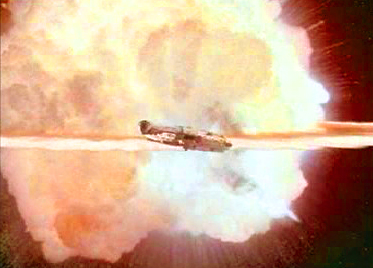
It's unlikely the United States or its closest allies would ever have allowed the United Nations' less-scrupulous members to take control of the internet, but knowing that the schemers have now tabled a public discussion is a sweeter victory.
And in keeping with Glenn Reynolds' Tech Central Station motif:

You can almost hear Kofi Annan spinning away through space in his executive TIE Fighter.
...To go to the moon:
President Bush wants to send Americans back to the moon — and may leave a permanent presence there — in a bold new vision for space exploration, administration officials said yesterday.And a permanent presence likely will include robots and communication satellites.
But beyond the nuts and bolts, Bush's call for a to return to space would give Americans something new to hope for - amid a period of permanent anxiety about terrorism.
Colonies! Vision! Robots! You can't imagine how giddy the article made me when I first read it this morning. With a domestic budget in the red, however, and a space program that's as directionless as it is traumatized, I can't see such grand objectives accomplished by the government. How could President Bush celebrate the triumph of America and the promise of space-age mankind in one sweeping gesture? One word, the same word we applied to aviation: privatization.
This isn't exactly the great deal for Microsoft products that consumers are looking for:
Software pirates in Malaysia are selling copies of an early version of the next generation of Microsoft Corp.'s flagship Windows operating system, company officials said Tuesday....According to the Business Software Alliance, a U.S.-based industry group, 68 percent of new software used in Malaysia last year was illegal—higher than the global average software piracy rate of 39 percent, but lower than that of some Asian countries, such as China. He didn't elaborate.
He doesn't need to. Commerce with countries struggling with or otherwise completely lacking the rule of law - and thus without robust intellectual property rights - barely qualifies as trade. It's more like controlled theft. The Chinese are oldhands at literally copying foreign designs, from aesthetics to function, and then flooding markets with product clones through willing third parties. Their "work" in the audio industry is so efficient it'd be admirable if it weren't, forgive the pun, patently unethical.
Free trade is impeccable in theory. In order for it to work in practice, an even legal playing field is incumbent on all parties.
A story that really frosts me is rare, but this (recurring) one finally tripped the wire. Consider this push for Totalitarianism Lite as Exhibit A in the presentation of why unelected world governments, especially those populated by despots, are a danger to free humanity:
A global summit scheduled in December may result in a proposal to put the Internet under United Nations control — an idea that has met solid resistance from the United States....The World Summit on the Information Society, sponsored by the International Telecommunications Union, the United Nations' key agency on telecommunications, will bring together more than 50 heads of state, along with an expected 5,000 to 6,000 government, business and non-profit representatives from across the globe to discuss in part "the yawning telecommunications gap between emerging economies and the developed world."
"Emerging economies"? Is that a euphemism for entire nations held hostage by jackbooted regimes or the rabble of backwards, dysfunctionally corrupt oligarchies - so more or less a buzzword replacement for "developing countries"? Why yes, I believe it is:
The effort for global control of the Internet is reportedly led by China, which allows its own citizens online access, but it is tightly controlled by a giant firewall and monitored by government surveillance.China has so far been joined in its efforts by representatives of Syria, Egypt, Vietnam and South Africa, said Ronald Koven, European representative for the World Press Freedom Committee, an international media watchdog based in the United States. Other reports indicate that Russia, India, Saudi Arabia and Brazil may be on board, too.
What a diverse action committee! Three democracies, two of them with room for improvement on accommodating civil rights; a post-Communist, statist republic; and four outright dictatorships. Henhouse - check. Wolves - check, check, check and check.
They say fewer than 3 percent of Africans can even access telecommunications of any kind.
They say fewer than 17 percent of African nations allow access to the ballot box without a hassle, while 48 percent withhold the right to vote altogether. Doesn't it follow, then, that the entire region won't exactly present many stable investments to telecommunications companies?
Currently, the International Corporation of Assigned Network and Numbers, a non-profit corporation with an international board of directors, manages Internet Protocol space allocation, domain names and root server system functions. It does not have content or security control functions.Critics of the global Internet idea say certain nations like China want to take away ICANN’s duties and place them under governmental auspices, along with increased control over security and content, placing freedom of press and individual freedom of expression at serious risk.
“Those governments don’t have any democracy or free speech, it’s dangerous and we’re trying to stop it,” said Julio Munoz, executive director of the Inter American Press Association in Miami. "Of course we are concerned they will try to manipulate the free flow of information."
Munoz's comments carry a certain comfort with them, especially since this isn't the first would-be usurpation of free media:
“We’re going to send a delegation there — to try and defend the press,” said Munoz, who recalled previously unsuccessful attempts in the 1970s and 1980s for U.N.-led media standards.
Nevertheless, let's give it a good rolling of the eyes. While we're at it, take a good look at the United Nations: elected leaders and strongmen in the same room, fundamentally at odds, deferring to non-representation and subjecting sovereign, self-governed nations to arbitrary demands of the least common denominators.
President Bush is not scheduled to attend the summit, which will be followed by another meeting in Tunisia in November 2005.
The choice of location must have symbolic intent, as there is no freedom of speech in Tunisia.
ADDING IMPRISONMENT TO INSULT AND INJURY: Could China's motives be any more transparent?
My office installation of Outlook Express receives a copy of messages sent to my addresses and opened at home, so the return to work after every holiday begins with sorting through several days'-worth of e-mail I've already read. Although I look wistfully back to the days of 1997 - when browsing through Netscape Communicator continued interrupted by pop-ups, and inboxes were filled only with correspondence you'd invited - I'm relatively unaffected by the noise that less scrupulous people consider commerce. The trickling inflow of spam messages is solved by two mouse clicks every half-hour, and my trusty SpyBot squashes anything particularly nasty on the internet. Exceptions would be mornings like this one, where forty-three out of forty-nine messages were junk. And that's when I share popular opinions like these:
Congress' [anti-spam] bill appears to underestimate just how deeply spam is hated. About 80 percent of consumers want spam banned or limited by law, according to a report from the ePrivacy Group and the Poneman Institute. And 74 percent want a federal do-not-spam list, much like the do-not-call list limiting telemarketing. Another 59 percent want spammers to be punished.
According to the article in Rocky Mountain News, this current attempt at legislation is not the silver bullet desired by the computing public. And to no one's surprise, some companies are playing boths ends against the middle, selling spam filters while opposing strict crackdowns on perpetrators. It'll be a tougher nut to crack than telemarketing, that's for sure. Ah, well: Two more clicks.
Though Glenn Reynolds has repeatedly discouraged visiting his site for a primary news source, I've found that between the obviously wide range of his sources and the abundance of daily posts, one can generally find all the latest headlines alongside some tidbits you otherwise wouldn't have discovered on your own. And in record time. Sound familiar? Instapundit is the closest competitor to Matt Drudge, I've felt for a long time now, and even though Reynolds' relatively gigantic audience of nearly six figures a day is a pittance of that viewing the Drudge Report (one one-hundreth, to be exact), his coverage of news has come to be more valuable and reliable.
Drudge came first. His page, spartan even for late-1997 HTML and virtually unchanged since, easily predated the popularization of web diary programs like Movable Type and the off-the-record, remark-as-you-go demeanor that came with them. At the forefront of the 21st Century's "New Media," Drudge's system is an early prototype, and operates with a separation of editor and reader much closer to that of a newspaper than a weblog. Surely, if we didn't know that Drudge was right of center leaning libertarian, we could read it well enough in the selection and rewording of many linked stories. And if you've ever listened to him on the radio, you'll agree that he more than makes up on the microphone for the infrequency of explicit opinions online.
Yet the Drudge Report maintains a certain editorial silence that - again, much like a newspaper - can't help but imply a certain objectivity. Sometimes Drudge simply posts a headline verbatim; maybe he adds a picture. He might have chosen to start his page with it out of political preference, but just as often he's only reflecting what's in the news; a visitor is taken to the real story encountering a minimum of interpretation. Therein lies the problem. Even if we don't lead ourselves into thinking that Drudge's latest roundup - however first-rate - is the only clutch of hype around the world, we're left with his mirroring of news sources, many of which don't deserve to be linked without questions asked.
Not sure what I mean? Take the big story in London today - or the story that should be, the protests that never were. Nowhere near the promised throngs materialized yesterday, and the promised "100,000" have yet to assemble today. But neither you nor several million people over the last hours would have found that out through Drudge:

Far be it for a guy like Matt Drudge - who's filled in for Rush Limbaugh more than once over the past month - to patronize the BBC, but there it is: a provocative photo linking to a pro-rally story by the public broadcasters. The BBC places projections of total demonstrators by its leftist organizers right next to police estimates (numbers which, I might add, haven't been corroborated by anybody who wouldn't want to see them as high as possible). No explanation of the radicals actually running the event. If someone's single internet stop today were that Drudge Report headline, they'd come away having read only the BBC, with an impression exactly as intended by forces in opposition to Tony Blair and George W. Bush - which is, presumably, that the whole of Great Britain ducked work to thumb their nose at both leaders.
Here's where Instapundit comes in - and comes out ahead. You see, the mass rejection that the left was hoping for fell well short of expectations. Reynolds would have just as easily blogged the event if numbers had reached 100,000. But they didn't, and he blogged the left-in as it flopped. He provided a roundup including witnesses, and even linked the same BBC story as Drudge, putting the damned fluff-piece into proper context.
This isn't the first time the line drawn between Big Media and Alternate Media has separated Drudge from the blogosphere. Over the past year or so have I come to feel that Drudge's technique, once revolutionary, now often provides a megaphone for the same tilted angle from mainstream broadcasters. His site offers a variety of media grabs, but aside from occasional scoops (Bill O'Reilly's "Talkola" admittedly one of the best in recent months), the majority of Drudge's posts are straight from the mainstream media. Many of those linked stories are typically biased or misleading. Drudge may do well in some regard to remove as much bias as he can by keeping commentary on a given story to a minimum; but the consequence of withholding judgment is to leave the article's own spin completely intact. Does that trade-off make for good reporting, "objective" or not?
Time will tell. I can't fathom either pundit losing energy or viewers over the long term - quite the opposite. But it should be interesting to see how the growing popularity of weblogs - helped in no small measure by Instapundit - affects the supremacy Drudge has enjoyed for a few years. And that popularity can be challenged without detriment to the Report - it's not as if people can't check both pages in one sitting. Even though I'll hit Instapundit for headlines right after my Fox News homepage has popped up, the Drudge Report is not far behind. A reverse habit is just as easy to get into. The question is this: how do you want your news?
REVISIONS, REVISIONS: Via IP, Iain Murray links to the above BBC link. The BBC has been correcting the story since early afternoon; first the number of demonstrators drawn was 30,000, then 70,000 and now the hallowed 100,000. Some news outlets are still relaying the number of 70,000 - and to put it politely, I'm still looking for more than rabidly left-wing, British [or otherwise] news companies to report that the leftist-Islamist production company delivered. And actually revealing the event's organizers is unlikely to come from any of the celebrating broadcasters. [Though one must say, even if the rally missed the mark of 100,000 it wasn't quite a flop.] Advantage? The blogosphere over Drudge, I'd reckon, especially since several on the right - including Instapundit - are already recanting. But then old Drudge has moved on to the inherent sexiness of Johnny Depp, which is why, no matter what, we'll always love the Drudge Report.
ONE MORE THING: Thank goodness none of the anticipated [or threatened] violence occurred. No matter how horribly misguided the protesters were today, they were by and large peaceful.
DID I SAY ONE MORE?: Number games aside, here's the real victory, awarded to Bush and Blair by the conservative Telegraph. Much as we little gadflies might have chattered, the nonsense going on in Trafalgar didn't make a lick of difference to a couple of men charged with protecting and expanding the free world. Once the excitement of the past two days passes from the West, only the responsibilities ahead - made plain by the second slaughter of innocents in Turkey - will be left.
Goodbye to an American icon:
The greetings from the president (Jimmy Carter) and U.N. chief (Kurt Waldheim) are way out of date. So is the gold-plated phonograph record that carries them, along with whale songs and frog calls, for any curious aliens who happen to find the vintage spacecraft. But Voyager 1, alert and healthy more than a quarter century after it was launched on a mission to Jupiter and Saturn, is still on the cutting edge. Last week, scientists reported that the spacecraft, now twice as far from the sun as Pluto, has picked up signs of the solar system's distant boundary. It will soon be humanity's first envoy to the stars....Now so far from home that the sun is just a bright star and radio signals take 12 hours to reach antennas on Earth, Voyager has enough plutonium in its nuclear-powered electrical generator to keep sending data until 2020. That may be just enough time for it to reach pristine interstellar space and bid its final farewell.
"Launched" right around the time of Voyager, I can feel a sense of time elapse - especially recalling a conversation with my father years ago that ended with him matter-of-factly describing the space probe's fate. It will just keep drifting and drifting, he said. Absent a collision, forever. The end of an era - and to me, a milestone - this might have made me a bit sad if not for the obvious silver lining. You see, when the Borg come, they'll assimilate Jimmy Carter first.
COULDN'T RESIST:


Do you Linux-box on the tweak-geek frontier? March in step with Apple's seamless choreography? Or is Bill Gate's capitalist empire-borne bazaar of hardware and software enough to keep you happy? PC Magazine pits the three major competing operating systems and their driving ethos against one another; answers for today and questions about tomorrow. Give it a read, no matter what your front end - I'd say there's enough bragging material for everybody.

Microsoft presented concepts and working solutions at the Professional Developers Conference 2003 for its next operating system, code-named Longhorn, and the pundits are atwitter. PC Magazine offers a comprehensive look at the respective futures for Microsoft and its competitors on both the Linux and Apple sides. Possibilities, wishful thinking and digital ownership conundrums: it's all there, with more tech jargon to fill two "...For Dummies" book glossaries. Fit a hand around the crown of your head to keep it from spinning, and enjoy the first few glimpses of the next binary frontier.
AND: Glenn Reynolds found the Microsoft-weblog connection. Well, who else?
Hosting Matters, my website host, has been hit by its third Denial-of-Service attack in less than a week. This one left me unable to access my account for nearly all of yesterday. Through midnight last night - and earlier this morning - Movable Type was a ponderous load. Graphics couldn't seem to be found, nor could I contact my FTP cache.
After conversing with tech support, I have the issue mostly resolved: this posting is proof of one challenge defeated, and the other - the menu's graphic interface - might take a little bit more finagling. I just need to configure the correct path.
So, barring any further attacks, posting shall resume as normal. To my tiny yet loyal audience, my apologies and promise for quality blogging in the future.
GOT IT: You can't see it from your end but trust me, Movable Type is back in perfect order and certainly easier on my eyes.
